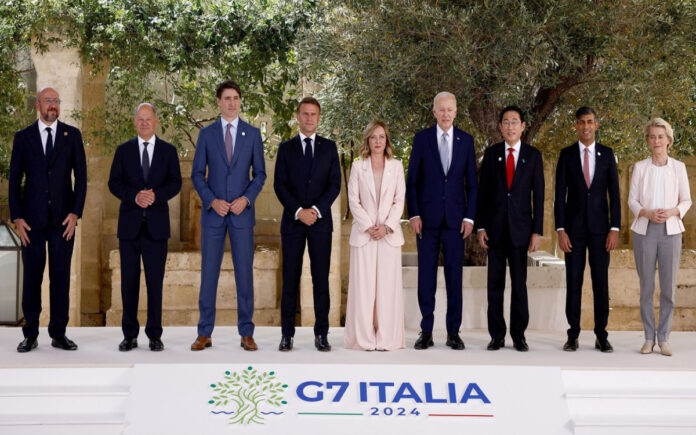Rome: The G7 countries have issued a stern warning to Iran, cautioning against the transfer of ballistic missiles to Russia and threatening consequential measures if such actions proceed. The Group of Seven leaders emphasized their concerns in a draft communique on Friday, also urging Iran to halt advancements in its nuclear enrichment program.
“We urge Tehran to cease and reverse nuclear escalations, and stop the continuing uranium enrichment activities that have no credible civilian justifications,” stated the document reviewed by Reuters.
Recent reports from the UN’s International Atomic Energy Agency indicate Iran’s acceleration of nuclear activities, including the installation of new cascades of advanced centrifuges and plans for additional facilities. The G7 called for Iran to engage in transparent dialogue and provide assurances that its nuclear program complies strictly with the IAEA’s monitoring and verification mechanisms.
Also Read | Putin Outlines Conditions for Ceasefire and Peace Talks with Ukraine
Iran maintains that its nuclear endeavors are solely for peaceful purposes, yet the G7 leaders expressed firm opposition to any potential agreement facilitating ballistic missile transfers to Russia, particularly amidst the ongoing conflict in Ukraine.
“We call on Iran to cease assisting Russia’s actions in Ukraine and refrain from transferring ballistic missiles and related technologies, which would constitute a significant escalation and direct threat to European security,” the statement underscored.
Also Read | Philippine Military Chief Urges Fishermen to Defy China’s New Coastguard Rules
The United States has categorized Iran’s recent moves as “nuclear escalations”, highlighting concerns about its capacity to enrich uranium to near-weapons-grade levels. While Iran’s current uranium stockpile is considerable, there is no current indication from the IAEA of intentions to enrich beyond present activities.
IAEA inspectors confirmed Iran’s use of IR-4 and IR-6 centrifuge cascades at the Natanz facility, enriching uranium to 2% purity, alongside ongoing activities reaching up to 60% purity. Plans to expand enrichment capabilities include deploying advanced IR-2m and IR-6 centrifuges at Natanz and Fordo sites, which significantly enhance Iran’s enrichment efficiency.



